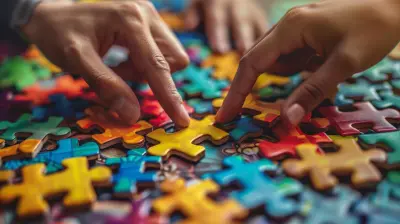The Relationship Between Sleep Disorders and Mental Health
10 November 2025
Have you ever laid awake at 3 AM, staring at the ceiling, your thoughts racing like a runaway train? You probably chalked it up to stress or maybe that late-night coffee. But what if I told you that your restless nights could be deeply intertwined with your mental well-being?
Welcome to the tangled web of sleep disorders and mental health—a complex, often misunderstood relationship that affects millions. This isn’t just about tossing and turning. This is about how your brain and your body keep talking in the dark while you're trying (and failing) to fall asleep.
Grab a blanket and a cup of something warm. We're about to unravel the mysterious relationship between your sleep and your sanity.
Why Sleep Matters More Than You Think
Before diving into the deep end, let’s cover the basics. Sleep isn't just a passive downtime when your brain flips the “off” switch. Think of it as your body’s nightly reboot—like turning your computer off and on to clear out the bugs and glitches.When you get quality sleep, your brain processes emotions, stores memories, and resets your stress levels. Your body performs critical maintenance too—regulating hormones, repairing cells, and boosting immunity.
Now imagine what happens when that system malfunctions. When sleep becomes fragmented, shortened, or completely disrupted, so do all the essential functions it supports. That’s when things start to spiral—mentally, emotionally, and physically.
The Chicken or the Egg: Sleep Disorders and Mental Health
Here’s the million-dollar question: does poor sleep cause mental health issues, or do mental health issues cause poor sleep?The answer? Yes. It's both.
This relationship is like a toxic friendship—you don’t know who started the argument, but it keeps going in circles, getting messier as it goes. Sleep disorders can trigger mental health problems, and mental health struggles can trigger sleep disorders. The two are locked in a vicious cycle, feeding off each other.
The Most Common Sleep Disorders That Mess With Your Mind
Let’s unpack the main culprits.1. Insomnia: The Classic Villain
Insomnia is the poster child for sleep disorders. Struggling to fall asleep, stay asleep, or waking up too early—all while feeling exhausted the next day? That’s insomnia.Chronic insomnia has been linked to an increased risk of depression, anxiety, and even suicidal thoughts. It’s like trying to run on empty every single day. Imagine your brain screaming for a break, but the off switch just won’t work.
2. Sleep Apnea: The Silent Suffocator
Obstructive Sleep Apnea is sneaky. You may not even realize you have it. This condition causes your breathing to stop and start while you sleep. And every time that happens, your brain wakes up—just enough to mess with your sleep cycle.Over time, these constant interruptions chip away at your mental resilience. Sleep apnea sufferers are more prone to mood swings, irritability, memory issues, and depression. It's like being on a rollercoaster your brain didn't sign up for.
3. Restless Leg Syndrome (RLS): The Unbearable Urge
Ever feel like you just have to move your legs at night? That’s RLS. It’s maddening and keeps you from falling asleep peacefully.This condition has been linked to anxiety and depression. Why? Because when your body won’t settle down, your mind can’t either. It’s like trying to meditate while sitting on a bed of nails.
How Mental Health Disorders Sabotage Your Sleep
Now let’s flip the script. How do mental health issues impact sleep?1. Anxiety: The Master of Overthinking
Anxiety is like having a thousand browser tabs open in your brain—none of them useful. When anxiety shows up, sleep takes the back seat.Racing thoughts, physical restlessness, and that gnawing sense of dread all make it incredibly hard to unwind. People with generalized anxiety disorder or panic disorder often report issues falling or staying asleep.
2. Depression: The Sleep Seesaw
Depression is tricky. Some people sleep all the time, while others hardly sleep at all. That’s because depression can hijack your sleep architecture—delaying REM sleep or shortening it entirely.This irregular pattern impairs emotional regulation and deepens the depressive state. It’s like being stuck in a dark room with no way out—and no energy to find the light switch.
3. PTSD and Trauma: Nightmares That Never End
Post-Traumatic Stress Disorder can wreak havoc on sleep. Vivid nightmares, night sweats, and constant hyper-awareness make restful sleep nearly impossible.Imagine trying to rest while your brain is stuck in survival mode. That’s what PTSD does. Sleep becomes a battleground instead of a safe haven.
The Brain on No Sleep: What’s Really Happening?
So what’s going on under the hood?Lack of sleep disrupts neurotransmitters—these are your brain’s chemical messengers, like serotonin and dopamine. When these messengers get scrambled, your mood, anxiety levels, and ability to cope with stress take a nosedive.
Chronic sleep deprivation also increases cortisol, the stress hormone. You might as well be living with a permanent alarm bell ringing in your head.
That foggy feeling? That’s your prefrontal cortex (responsible for decision-making and emotional control) taking a hit. When it's offline, everything becomes harder—thinking clearly, keeping your cool, even forming memories.
Children and Teens: The Hidden Epidemic
It’s bad enough for adults, but what about young minds?Many teens suffer from undiagnosed sleep disorders, and the impact on their mental health can be devastating. Depression, anxiety, ADHD-like symptoms—they're all connected to lack of proper sleep.
And the worst part? Because they're still developing, the long-term effects can echo far into adulthood. It's like building a house on a shaky foundation.
Social Media, Blue Light, and the Sleep Thief
Let’s talk about something you probably have within arm’s reach right now: your phone.Blue light from screens tricks your brain into thinking it’s still daytime. That delays melatonin production—a hormone that makes you sleepy.
Add in the endless scroll, social comparison, and doom-scrolling? You’ve got a recipe for anxiety-induced insomnia. The modern world isn’t just robbing your time; it’s stealing your ability to rest.
How to Break the Cycle: Healing Sleep and Mind Together
Ready for some good news? The cycle can be broken. Yes, it takes effort, but it’s absolutely possible to reclaim your sleep and your sanity.1. Cognitive Behavioral Therapy for Insomnia (CBT-I)
CBT-I is a game changer. It helps you retrain your brain, challenge negative thoughts around sleep, and develop routines that support healthy sleep patterns. It’s not some fluffy self-help—this is science-backed therapy that works.2. Mindfulness and Meditation
Mindfulness techniques help calm your nervous system. They bring you into the present moment and reduce that mental noise keeping you up at night.Try deep breathing exercises or guided sleep meditations. They’re like lullabies for your overactive brain.
3. Limit Stimulants and Establish a Routine
Caffeine after 2 PM? Nope. Scrolling TikTok at midnight? Big no. Your brain craves consistency.Go to bed and wake up at the same time every day, even on weekends. It might feel boring, but it’s magical for your circadian rhythm.
4. Consider Professional Help
If you suspect a sleep disorder or you're battling mental health issues, don’t go it alone. Psychiatrists, psychologists, and sleep specialists exist for a reason. And there’s zero shame in seeking help—your future self will thank you for it.Final Thoughts: It’s Not All in Your Head—But It Kind Of Is
Sleep and mental health are dance partners, tangled together in a complicated routine. When one moves out of step, the other stumbles. But with awareness, self-care, and sometimes professional guidance, you can restore the rhythm.So the next time you’re lying awake at night, remember—you’re not alone, and you’re not broken. Your mind and body are trying to tell you something. It might be time to listen.
Because the secret to a peaceful mind might just begin with a good night’s sleep.
all images in this post were generated using AI tools
Category:
Psychological DisordersAuthor:

Nina Reilly
Discussion
rate this article
1 comments
Rocket Ortiz
Sleep disorders aren't just annoying; they’re a mental health crisis waiting to explode. Ignoring the link between sleep and psychological well-being is a disservice to ourselves and those we care about.
November 11, 2025 at 4:49 AM

Nina Reilly
Absolutely! The connection between sleep disorders and mental health is crucial. Addressing sleep issues is vital for overall well-being and can significantly impact our emotional and psychological health. Thank you for highlighting this important topic!


